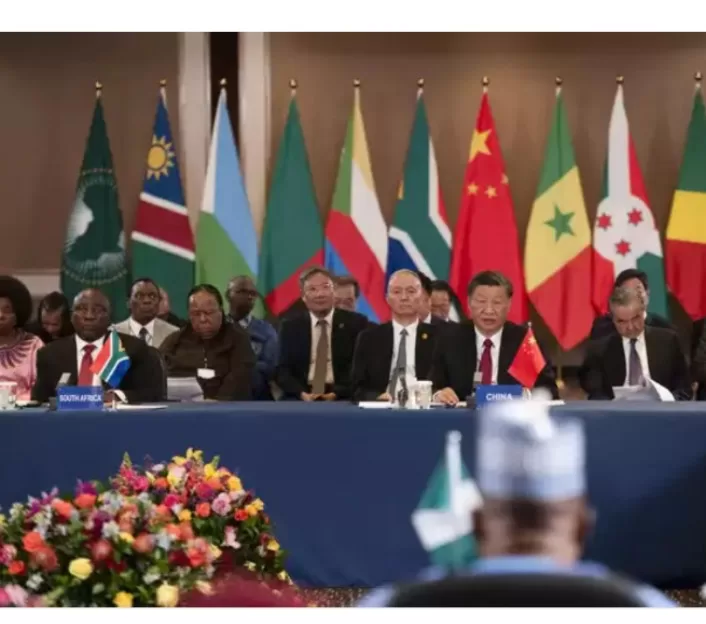In an illuminating revelation, the introduction of six novel members into the BRICS consortium, slated for January, is anticipated to culminate in a collective GDP share of merely 11 percent, with Saudi Arabia emerging as the most substantial contributor at 4 percent, as delineated by a comprehensive analysis. The impending inclusion of Argentina, Egypt, Ethiopia, Iran, Saudi Arabia, and the United Arab Emirates into the established BRICS alliance, comprising Brazil, Russia, India, China, and South Africa, will, however, precipitate an augmentation in the consortium’s stake in the global GDP, ascending from 26 percent to an imposing 30 percent. Correspondingly, the collective population share will rise to an impressive 46 percent, as ascertained by a comprehensive analysis conducted by SBI Research.
This momentous expansion strategy, set to come into effect on January 1, 2024, was formally declared during the recent BRICS summit convened in Johannesburg.
Presently, China assumes the mantle of delivering 70 percent of the BRICS’ GDP, a figure that is poised to diminish to 62 percent, while India’s contribution, standing at 13 percent at present, will undergo a subtle reduction to 12 percent. Concurrently, Russia’s share will diminish by 7 percent, South Africa will be halved to a meager 1 percent, whereas Brazil’s share shall remain invariant, an exception for which the report abstains from offering a rationale.
Among the new entrants, it is anticipated that Saudi Arabia shall emerge as the most influential economic actor, boasting a substantial 4 percent contribution to the collective GDP. Argentina, the UAE, and Egypt shall follow suit, each accounting for a commendable 2 percent, while Iran shall augment the GDP by an additional 1 percent, with Ethiopia’s inclusion leaving an almost imperceptible impact on the conglomerate’s economic landscape.
In terms of economic stature, Saudi Arabia currently presides over an economy of USD 1.1 trillion in 2022, an already established G20 member. Argentina’s economy stands at USD 632 billion, the UAE commands a substantial USD 507 billion, Egypt wields an impressive USD 477 billion, Iran boasts an economy of USD 388 billion, and Ethiopia’s economic imprint is valued at USD 127 billion, all based on available data.
The amalgamated economic prowess of these six new constituents will infuse a mere 11 percent into the existing GDP framework of BRICS, as elucidated in the report. In the broader perspective of the global economy, this translates to a 4 percent contribution in 2022 terms, elevating the BRICS+6’s cumulative influence to an impressive 30 percent.
Remarkably, even after this momentous inclusion, China (with a GDP of USD 18.1 trillion in 2022) and India (with a GDP of USD 3.75 trillion) will perpetuate their dominance, jointly contributing 74 percent to the conglomerate’s aggregate GDP. This constitutes a modest decline from the pre-expansion scenario, where these two nations commanded a formidable 83 percent of the USD 26.2 trillion economy.
Russia’s economy, in the year 2022, stood at USD 2.2 trillion, Brazil’s economy registered USD 1.8 trillion, and South Africa’s economic footprint amounted to USD 468 billion.
The BRICS+6 consortium, in tandem with the G20 (comprising the 20 largest global economies), presently commands a population share of 3.7 billion and 5.1 billion, and a GDP share of USD 29.2 trillion and USD 70.4 trillion, respectively. Furthermore, their cumulative forex reserves stand at USD 5.5 trillion and USD 9.4 trillion, respectively.
To place this into perspective, the existing BRICS quintet accounts for 40 percent of the world’s population, controlling 26 percent of the global GDP. However, with the incorporation of the six new members (BRICS+6), this GDP share will ascend to 30 percent, and the population share will surge to an imposing 46 percent.
Intriguingly, the most significant transformation will manifest in the realm of global oil production, surging from the current 18 percent to an astounding 40 percent, with a concomitant spike in oil consumption, ascending from 27 percent to 36 percent. Moreover, the collective share in global merchandise trade is poised to rise from 20 percent to 25 percent, while that of global services trade shall increase from 12 percent to 15 percent, as outlined in the report. This shall be accompanied by an augmenting share in global forex reserves, witnessing a commendable 600 basis points upswing to reach 45 percent.
This seismic transformation, particularly in the oil trade arena, where Saudi Arabia, bearing the second-largest oil reserves post-Russia, holds sway, is poised to usher in an epochal transformation in the arena of payment systems and price discovery, thereby signifying a potential game-changer, as underscored by the report.







